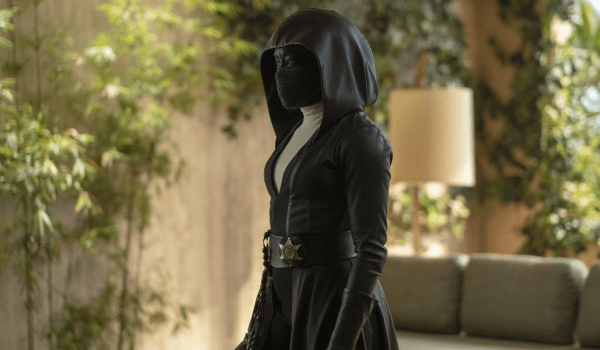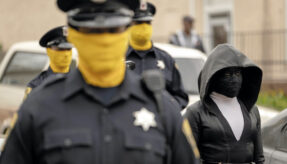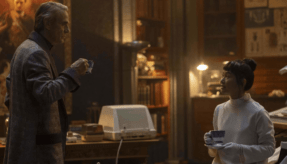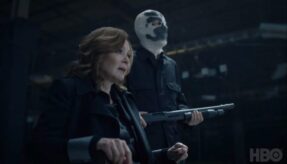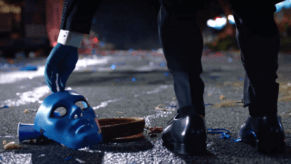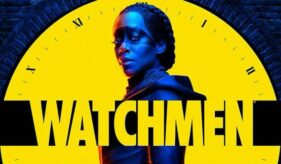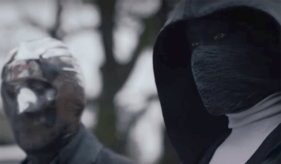TV Review: WATCHMEN: Season 1, Episodes 1-3: An Exciting & Imperfect Adaptation Filled with Gratifying (and some Grating) Moments [HBO]
Table of Contents
Watchmen Season 1 Episodes 1-3 Review
Watchmen: Season 1, Episode 1: It’s Summer and We’re Running Out of Ice, Episode 2: Martial Feats of Comanche Horsemanship, and Episode 3: She Was Killed by Space Junk are the entertaining beginning chapters of the sequel to comic book series Watchmen. The initial episodes more effectively than not deal with the aftermath of the events of Alan Moore and Dave Gibbons‘ seminal storyline.
The first three episodes are not perfect. Lovers of the source material bring with them exceedingly high expectations and the desire to see familiar faces. The former is because of the quality of the source material and the latter occurs because fans want to learn what happened to the survivors of Moore and Gibbons’ storyline (this begins to occur during the first episode).
There are numerous Easter Eggs that readers of the original storyline will recognize in the first three episodes (Dr. Manhattan being on Mars, images of the original Watchmen, electric vehicles, etc.), but its the aftermath aspects of the original comic book events on society that are the most intriguing e.g. the squid rain – it’s brilliant i.e. what Adrian Veidt / Ozymandias (Jeremy Irons) did at the end of the comic book series had an unexpected, lingering side-effect.
The 7th Cavalry Problem
Like in the Christopher Nolan Batman trilogy, masked heroes sometimes create a byproduct in the areas they patrol, namely masked villains. In the Watchmen TV series, these identity-hiding bad guys are The 7th Cavalry, the show’s boogeymen villains reduced to stereotypes in an attempt to ground them in reality.
The stereotyped men behind the knock-off Rorschach masks do exist in our society, you’ve seen them in town, heard of them on television. Laced with bigotry and rooted in America’s past of xenophobia, homophobia, and out-right racism, The 7th Cavalry are rendered as men that have traded one white mask for another.
Watchmen would be better served if a stereotype was not its main villain though the twisting of a crime fighting trademark (i.e. the Rorschach mask) is a good plot point.
Beyond their two-dimensionality, The 7th Cavalry are audacious, perpetrating a mass cop killing that prompts the surviving police (those that don’t quit) to don masks, the chief instrument of the vigilante whom they formerly chased and loathed. Left off-screen, the societal juxtaposition that this caused must have been jarring.
Character Camaraderie
The camaraderie and friendship between Angela Abar / Sister Night (Regina King) and Tulsa Police Chief Judd Crawford (Don Johnson) successfully builds a different aspect of the Watchmen television series. The highlights of this relationship are: the dinner scene (with singing) in It’s Summer and We’re Running Out of Ice, the conversation after the dinner, Sister Night hugging Crawford’s hanged corpse in Martial Feats of Comanche Horsemanship, and Abar and Crawford’s hospital talk after The 7th Cavalry’s police massacre.
It’s the singing moment in It’s Summer and We’re Running Out of Ice that stands out for not only Don Johnson’s acting but for how it benefits Chief Crawford’s character, making him more three-dimensional, relate-able, and creating an endearing situation in the TV series outside of costumes and masks.
The Show’s Violence and the Inexplicable
The Watchmen TV series is as brutal as the source material with cops as violent as the very people they seek to thwart. This violence is stymied by a strange police protocol where the police have to prove that a threat is present and violence is imminent before their sidearms are released via an electronic lock. It creates true tension in It’s Summer and We’re Running Out of Ice but it is also idiotic.
How many times have police officers encountered a situation where they didn’t have time to call into headquarters for gun unlock permission? How many cops have died making that call?
And one would think that after the cop massacre in Martial Feats of Comanche Horsemanship, sidearms, long guns, and body armor (à la the police officers in Robocop) would be prevalent amongst the Tulsa police force yet its inexplicably the opposite, as if the United States’ streets were suddenly as safe as Great Britain’s streets.
Evolving Mysteries in the Post-alien Squid World
Vexing yet exciting aspects of the TV series include: the mystery surrounding Will Reeves (Louis Gossett Jr.) (I think he is a former superhero), the initial question mark surrounding the children in Abar’s household, and creation and deployment of the Tulsa Police Department’s advanced interrogation room (cube).
With regard to the latter, the specialized interrogation room is a plot device that serves multiple functions including a continuing commentary on the current world, its antagonists, its protagonists, and most-cleverly, the past.
The fact that people classified as terrorists have no rights is an interesting fact that pops up during one cube interrogation session while the skewed sight of the infamous ‘alien’ squid may make certain viewers jump out of their seat with excitement. Even-though it is glimpsed only briefly, it is still tantalizing – would a full view of the squid, and its devastation, have been as aching?
The Most Interesting Character So Far
F.B.I. Agent Laurie Blake (Jean Smart)’s hatred, and self-hatred, for superheroes / masked vigilantes is established in spectacular fashion at the beginning of She Was Killed by Space Junk.
By the end of She Was Killed by Space Junk, Watchmen‘s writers set up Agent Blake as the most-interesting character in the series. It has equal parts to do with how the character is acted, written, and the fact that she enters the TV series with a past that has already been established. The mystery is what happened to her, besides the obvious, between the ending of the comic book series and her intro in the television continuation.
Doctor Manhattan Drops In
The dialogue that screenwriters Damon Lindelof and Lila Byock write for Agent Blake in She Was Killed by Space Junk in the Mars Phone Booth scenes is a glimpse into her bleak, jaded outlook on life, along with the fact that though she is in the present, she dwells in the past. If its not the best dialogue in the episode, it certainly is the most memorable. Blake must have been making phone calls to Mars for years and never heard a peep in return. When Doctor Manhattan finally ‘answers’ Blake in this episode, in the bluntest of ways, her resultant laughter is like an old prisoner in her body suddenly released into the world again. It’s probably been years since she’s laughed so.
Leave your thoughts on this Watchmen Season 1 Episodes 1-3 review and these episodes of Watchmen below in the comments section. Readers seeking more TV show reviews can visit our TV Show Review Page, our TV Show Review Twitter Page, our TV Show Review Facebook Page, and our TV Show Review Pinterest Page. Want up-to-the-minute notification? FilmBook staff members publish articles by Email, Twitter, Facebook, and Tumblr.
Related Articles
FilmBook's Newsletter
Subscribe to FilmBook’s Daily Newsletter for the latest news!







